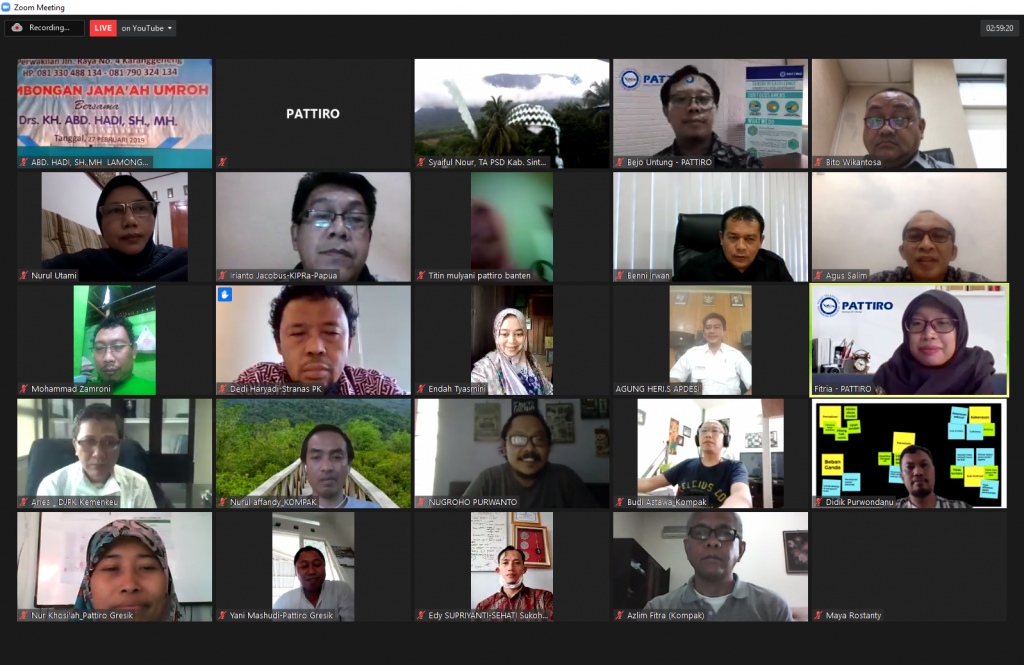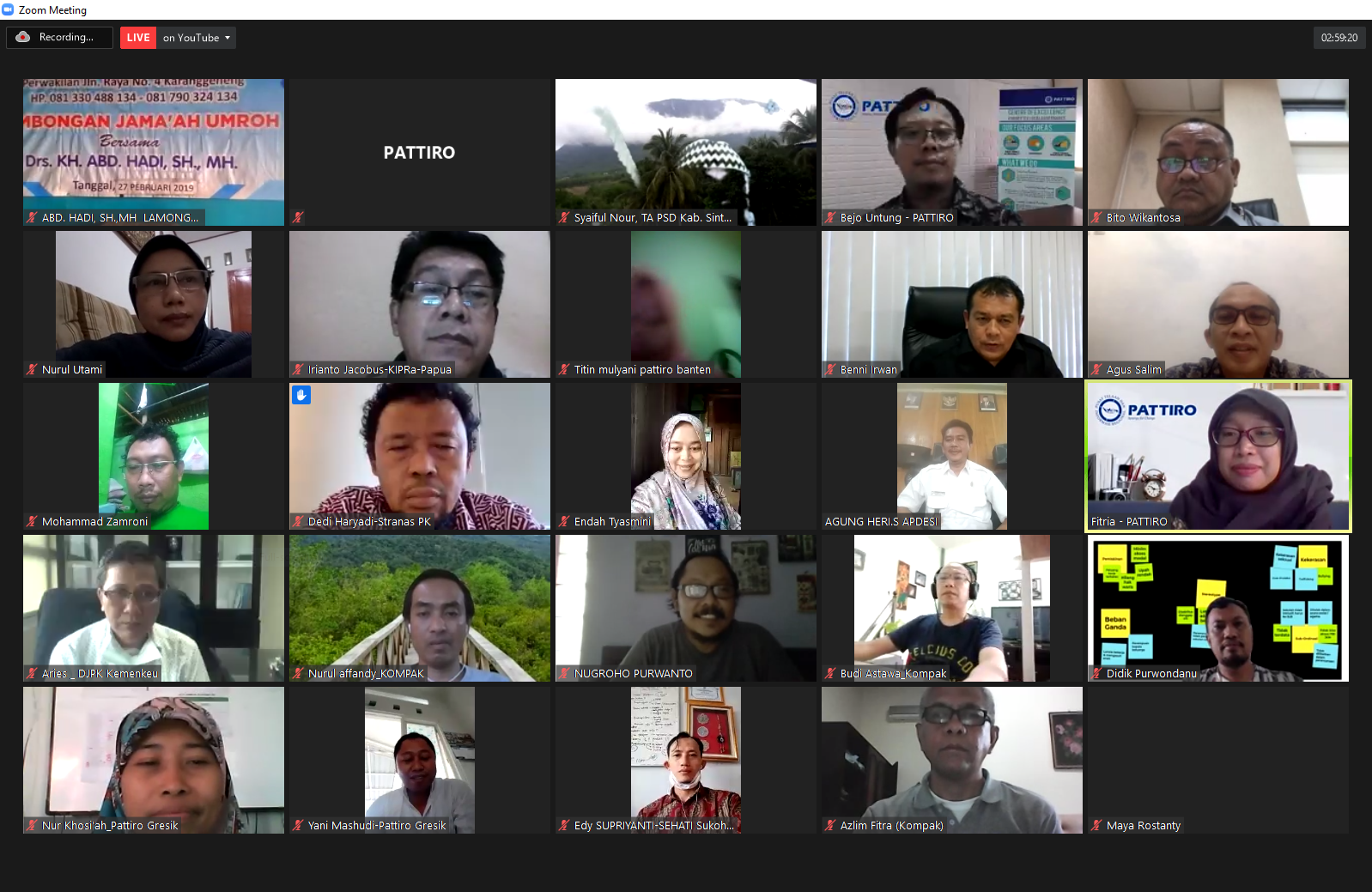
In view of the COVID-19 pandemic, the government has established a policy to anticipate the spread and impact of the disease, through Government Regulation in lieu of Law (Perppu) No. 1/2020, which has been promulgated as Law No. 2/2020.
One of the effects of the issuance of the policy was the prioritization of the utilization of the Village Fund for Direct Cash Transfer (BLT) aid. This requires villages to quickly make changes to the predetermined village budget. To minimize the obstacles faced by the villages in making these changes, three related ministries, namely the Ministry of Finance, the Ministry of Home Affairs and the Ministry of Villages, Development of Disadvantaged Regions and Transmigration, issued separate policies. However, these varied regulations in fact cause the village governments to suffer from confusion. That was one of the points raised in the Local Governance Forum, held online by PATTIRO, in collaboration with the Indonesian Village Governments Association (APDESI) on Thursday, June 18, 2020.
According to the Secretary General of APDESI, Agung Heri, in general the villages experienced a dilemma. On the one hand, they are required to make changes quickly, but on the other hand, they find difficulties for having to learn about various kinds of regulations, especially if there are rapid changes in regulations. “What is needed by the villages is a practical guide that can be learned and implemented quickly,” said Agung.
The same thing was conveyed by PATTIRO Director, Maya Rostanty. According to Maya, at the minimum there should be a joint decision between ministries, so that there is a single regulation that can be easily used as a guideline. “As an example, we can see the practice of refocusing and reallocation of APBD that is regulated through a Joint Decree of the Minister of Home Affairs and the Minister of Finance. This helps local governments make quick changes to the regional budget,” Maya said.
Responding to this, the Director of the Ministry of Finance’s General Transfer Fund Adriyanto stated that it was not the government’s intent to complicate the villages. In fact, through the new Minister of Finance regulation, namely PMK Number 50/PMK.07/2020 regarding the Second Amendment to the Regulation of the Minister of Finance Number 205/PMK.07/2019 regarding Village Fund Management, the Government provides relaxation in terms of disbursement of Village Funds. Referring to the regulation, the disbursement of the Village Fund for the second phase does not have to be accompanied by any document requirements. Adriyanto also denied that the three ministries did not coordinate. According to him, the three ministries intensively coordinate before issuing their respective policies. Adriyanto added that the issuance of various Ministerial regulations was a form of implementing the mandate of Law No. 2 of 2020 concerning the Establishment into Law of Perppu Number 1 of 2020 concerning State Financial Policies and Financial System Stability for Handling the Corona Virus Disease 2019 (Covid-19) Pandemic and/or in the Context of Facing Threats that Endanger the National Economy and/Or Financial System Stability.
Meanwhile, the Director of Basic Social Services at the Village Ministry, Bito Wikantosa convinced the village governments not to worry when making changes to the APBDes. “The key is in the village meeting. Whatever decision is taken in relation to the allocation of BLT DD, including the decision to change the APBDes, if it is agreed upon in a village meeting, then the decision has been legally valid,” said Bito.
According to Bito, Minister of Village Regulation No. 6/2020, updated with Minister of Village Regulation No. 7/2020 concerning Priority for the Use of Village Funds in 2020, is a clear guideline for the village governments in allocating its APBDes prioritized for BLT. Bito also assured that there is no conflict between the regulations of the Minister of Village and the Minister of Finance. “Each regulation has its own scope,” Bito added.
Benny Irwan, the Director of Village Government Finance and Assets Facilitation of the Ministry of Home Affairs, added that although his ministry also issued a regulation on the allocation of the APBDes for BLT, he was certain that the regulation did not conflict with the Regulation of the Minister of the Village. According to him, the regulations issued by the two ministries are complementary. For example, if the Regulation of the Minister of the Village only regulates BLT from the Village Fund, the Instruction of the Minister of Home Affairs No. 3/2020 regulates village opportunities to use other sources of income, for example Village Fund Allocation (ADD) as BLT. The regulation also provides guidelines for villages to include allocations for handling COVID-19 in the Unexpected Expenditures nomenclature and instructs governors and district heads/mayors to facilitate APBDes changes.
Benny added that his ministry had also unlocked the Village Financial System (Siskeudes) account to facilitate the villages to redo their inputs due to changes in the APBDes.
Village Funds are Still Disbursed
The discussion also raised the concern that the disbursement of Village Funds would cease during the COVID-19 pandemic. This concern arises because of the provisions in Article 28 paragraph (8) of Law no. 2/2020 which annulled Article 72 paragraph (2) of the Village Law. This assumption is refuted by Bito. According to him, the provisions of Article 72 paragraph (2) of the Village Law only regulates the implementation of programs that use the Village Fund, while the provisions governing the transfer of Village Funds are found in Article 72 paragraph (1).
“As long as Article 72 paragraph (1) of the Village Law is still valid, the Village Fund transfer will still be there. So, do not believe in hoaxes,” Bito explained. The same thing was stated by Adriyanto. “Village Funds still exist,” said Adriyanto.
For those who want to follow this discussion in full, you can watch it below.






